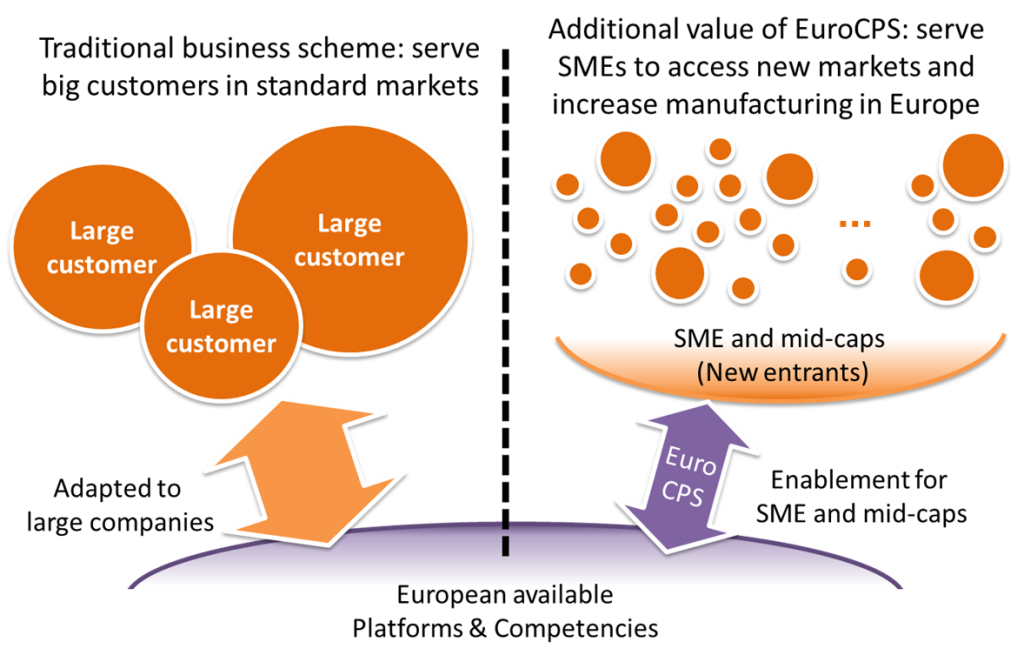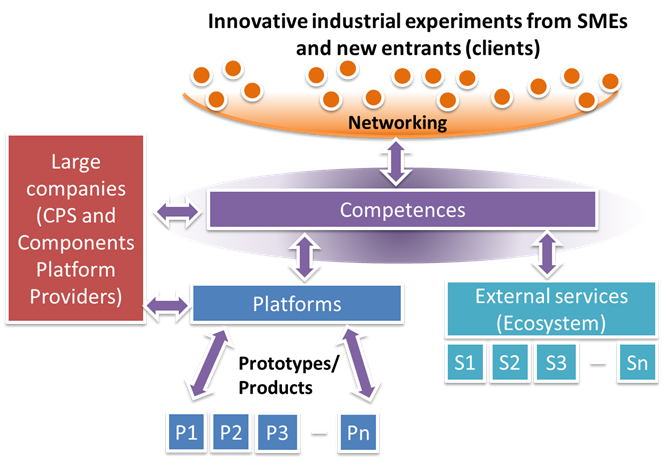EuroCPS aims at building a full CPS value chain of competences and platforms to enable third parties from any sector to build innovative CPS products. It brings together all the key European players in a network of competences to service third parties. It complements third party initiatives in FP7 and H2020 and is in line with existing ENIAC/ARTEMIS and future ECSEL actions to build HLG KET’s pilot lines. The EuroCPS project will act as a facilitator to mitigate ecosystem complexity, thus lowering entry barriers. A set of target applications will be selected according to the available competencies/platforms in the network and strategic EU priorities.
Embedded systems and Cyber Physical Systems (CPS) are key drivers for the innovation capacity of European industries, large and small, generating economic growth and supporting meaningful jobs for citizens. They offer solutions to some of the difficult societal challenges addressing European policies for 2020 and beyond. For both reasons, it is vital that investments are made to assure European collaboration and the access to technologies, know-how and capacities, which guarantee growth potential and strategic independence in the face of increased globalisation.

The goal of the EuroCPS project is to create synergies between emerging and established organizations operating in the CPS sector. The SME players entering new market segments generally lack a sufficient knowledge of the value chain and the required skills to master the whole design process from ideas to products. In order to succeed, these innovators will need coaching to understand the innovation ecosystem, access to the technologies of established players and capacity to accelerate technology transfer. EuroCPS aims at helping third party and new entrants to build embedded system solutions targeting innovative products in IoT domains. It will provide the required expertise and knowledge to enable end-to-end system solutions. It will act as a facilitator to hide ecosystem complexity lowering entry barriers while the R&D will be made by industrial partners. EuroCPS will be a one-stop-shop for emerging products with a business model accessible to third parties and new entrants willing to design new CPS products. It will have 3 roles:
1
Identifying companies (mainly SMEs) that would gain additional competitive advantage by making smart or smarter products with the help of networking partners. Thanks to a large European network of local ecosystems in different application domains, including manufacturers of end products, networking companies and research institutes, EuroCPS will reach a large number of third parties to help them to design CPS products. Potential industrial experiments will be selected through open project calls. The selection process will be carried out through a strict formal process. Networking partners will also help third parties to formulate their needs with regards to industrial constraints, evaluate the business opportunity.
2
Helping third parties to implement selected industrial experiments. In cooperation with platform partners, the competence partners will help third parties to explore the potential solutions, identify the components and the services required to build the final CPS product, validate the industrial feasibility to deliver prototypes for the target CPS product.
3
Facilitate access to external services and infrastructures of the EuroCPS ecosystems. Building CPS and system prototyping and manufacturing may need aligning the right actors from local ecosystem, providing advanced infrastructures and services. In case additional heavy R&D is needed to build products, EuroCPS beneficiaries will help third parties in reaching additional funding through other instruments (e.g. SME instrument, ECSEL).

The value chain required to build new CPS products generally includes an ecosystem (swarm of specialized players providing SW, IP, Tools, design services) and platform providers (e.g. infrastructures underlying the execution for SW and design/fab processes for HW). An Enablement infrastructure, here the competence centres, is required to adapt (make available) the design ecosystem tools and services and the platforms for end products. This infrastructure is traditionally built by large companies as an internal service and considered as a strategic competitive advantage. However this is generally restricted to service big customers and uses only services and IP from established players. EuroCPS will operate as an enablement party to make available some selected platforms to third parties (small customers). This overall structure will be driven by the needs of third parties through selected industrial experiments and aimed to produce prototypes of innovative products. The competence centres may use existing (internal or external) design tools and methods for implementation.